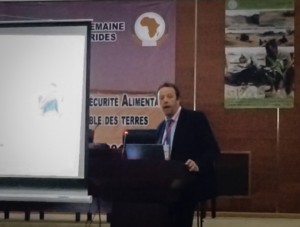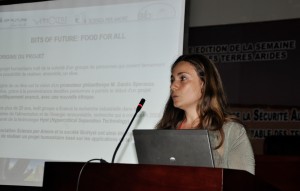Scienza per Amore at the Second Africa Drylands Week – N’Djamena, Chad – August 25/29, 2014
 On August 27, 2014, the Association Scienza per Amore presented the project of cooperation Bits of Future: Food for All at the Second Africa Drylands Week forum, organized in N’Djamena by the Government of Chad and the African Union.
On August 27, 2014, the Association Scienza per Amore presented the project of cooperation Bits of Future: Food for All at the Second Africa Drylands Week forum, organized in N’Djamena by the Government of Chad and the African Union.
The Forum explored the possibility of increasing agricultural productivity in the African deserted territories, an opportunity closely related to food security.
The participation of Scienza per Amore in the event follows the recent meeting with Her Excellency Rhoda Peace Tumusiime, Commissioner for Rural Economy and Agriculture, during which the HYST (Hypercritical Separation Technology) was officially presented. The technology was considered an example of best practice applicable to many African countries, and was therefore deemed suitable for The Great Green Wall for the Sahara and the Sahel Initiative (GGWSSI). It was chosen to be presented to the Ministers of the countries participating in the Second Africa Drylands Week, by Scienza per Amore.
On this occasion Barbara Carrubba (External Relations, Scienza per Amore) and Pier Paolo dell’Omo (President of the Association) explained the guidelines of the project Bits of Future and the potential of the HYST to improve resources in arid areas.
The section dedicated to the enhancement of specific local resources (water hyacinth) generated great interest. The water hyacinth (a terrible pest plant of South American origins) damages the African countries’ economy by hindering navigation, reducing marine life and facilitating many diseases to spread.
The HYST units (which the project Bits of Future: Food for All will provide to the interested countries free of charge) can turn the water hyacinth into a source of food and energy. Similar results have already been achieved enhancing other biomass types, in particular milling industry’s byproducts could produce flours rich in protein, as well as dietary supplements of iron, zinc and vitamins.
All the attending African representatives and the GGWSSI executives for the various countries (in particular Chad, Mauritania, Mali, Burkina Faso and Uganda), greatly appreciated the reports presented by Scienza per Amore. The technical team of the local Ministry of Agriculture and Livestock suggested to immediately start the research to enhance other typical Sahelian biomass for food and pharmaceutical usages.
The final acts of the convention furtherly emphasized the valuable contribution that the HYST could provide to achieve the Great Green Wall project. At the end of the Forum the Minister of Agriculture and Environment of Chad, Her Excellency Amane Rosine Baîwong Djibergui, underlined how exploiting natural resources (especially the currently problematic ones) can become a source of wealth and a way to sustainably manage drylands. Moreover, the Minister declared: “Our means are first of all ourselves”.
These conclusions are consistent with the mission of Bits of Future: Food for All, which aims at providing an instrument to improve local resources. It is important that the development starts from the existing activities of the countries and populations that would be provided with the HYST.
By virtue of these positive results, the road map of Bits of Future sees tests carried out on biomass sent from Africa, in the presence of representatives of the respective Governments. These actions will hopefully encourage countries friends with Africa to help restarting the continent’s economy, so as to create an increasingly dense network of mutual relations.



